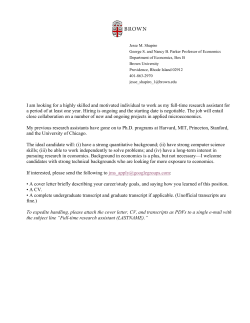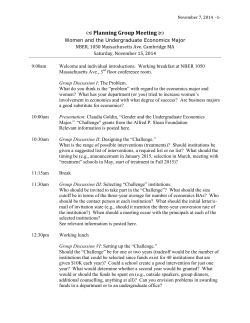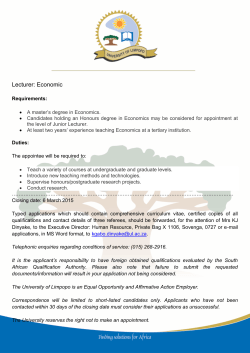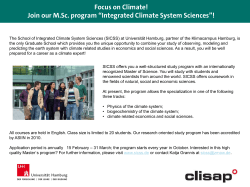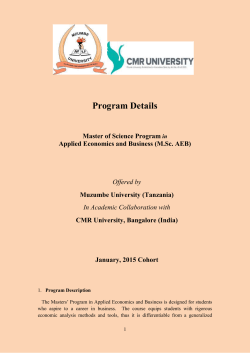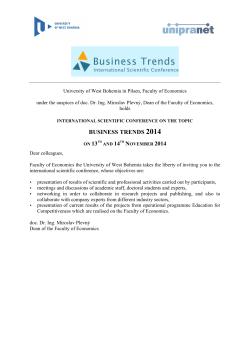
Anja Tolonen
Anja Tolonen PhD Candidate Home Address: Office: 5454 S Shore Dr. Apt. 818 Chicago, IL, 60615 USA Cell Phone: +1-510 229 8944 Department of Economics University of Gothenburg Vasagatan 1, Box 640 SE 405 30 Gothenburg Phone: +46-(0)31 786 1264 E-mail: anja.tolonen@economics.gu.se Web page: www.anjatolonen.com Citizenship: Swedish Fields of Concentration: Development Economics Labor Economics Health Economics Resource Economics Desired Teaching: Development Economics Labor Economics Health Economics Resource Economics Dissertation Title: Mining Booms in Africa and Local Welfare Effects: Labor markets, Female Empowerment and Criminality Expected Completion Date: May 2015 Graduate Studies: University of Gothenburg, 2010 to present Supervisors: Professor Måns Söderbom and Associate Professor Andreea Mitruut University of California at Berkeley, 2013-2014 Visiting Researcher at Department of Economics Supervisor: Professor Edward Miguel University of Oxford, 2012-2013 Visiting DPhil Student in Economics at Department of Economics Supervisors: Professor Francis Teal and Associate Professor James Fenske Affiliations: Oxford Centre for the Analysis of Research Rich Economies, Center for the Study of African Economies Undergraduate Studies: Master of Science in Economics, University of Gothenburg, 2010 Fellowships, Honors and Awards: UNRISD Young Scholar Think Piece Series: Extractive Industries, 2014 Siamon Stiftelsen Travel Grant, 2014 Bo Samuelson’s Graduate Exchange Stipend to UC Berkeley, 2013 2 The Hedelius Scholarship for Postgraduate Studies at Foreign Universities, 2012 ISEO Summerschool Travel Grant, 2010, 2013 Lars Hjerta Research Support for Mineral Mining in Sub-Saharan Africa, 2012 Adlerbertska Stipendiestiftelsen Travel Grants, 2012, 2014 Paul och Marie Berghaus donationsfond Travel Grant, 2012, 2013, 2014 Research Experience: Short Term Consultant, The World Bank Group, The Research Group: Trade and International Integration. 2014. Short Term Consultant, The World Bank Group, The Office of the Chief Economist for Africa. 2014. Report: The Socio-economic Impact of Gold Mining in Ghana: Evidence from the Third Gold Rush Teaching Experience: Lecturer, Transparency Initiatives in Economics (PhD level), 2014 Visiting Lecturer, Econ 98/198: Natural Resource Conflicts and Corporate Social Responsibility (Undergraduate level), at UC Berkeley, Course Facilitator Professor Edward Miguel, 2014 Teaching Assistant, International Economics (Undergraduate level), 2014 Teaching Assistant, Macroeconomics (Undergraduate level), 2013 Teaching Assistant, Microeconomics (Undergraduate level), 2012 Papers: “Local Industrial Shocks, Female Empowerment and Infant Health: Evidence from Africa’s Gold Mining Industry” [job market paper] “African Mining, Gender and Local Employment” (with Andreas Kotsadam), OxCarre Research Paper 114. University of Oxford, 2013. Works in Progress: “Criminality and Mining: Evidence from South Africa” (with Sebastian Axbard and Jonas Poulsen) [third dissertation chapter] “Restrictions to Mobility and Access to Health Care: Evidence from the West Bank” (with Caglar Ozden, Bob Rijkers and Roy van der Weide) “The Socio-economic Impact of Gold Mining in Ghana: Evidence from the Third Gold Rush” (with Andreas Kotsadam) Conference and Seminar Presentations: Northeastern Universities Development Consortium Conference, Boston, 2014, Planned Department of Economics, University of Copenhagen, 2014, Planned 9th IZA/WB Conference on Employment and Development, Lima, 2014 Workshop for socioeconomic impact of mining in Africa, The World Bank, 2014 Agriculture and Resource Economics, UC Berkeley, 2014 Women in Economics, UC Berkeley, 2014 Centre for the Study of African Economies Conference, University of Oxford, 2014 Pacific Development, UCLA, 2014 Economics Department, UC Berkeley, 2014 3 Working Group for African Political Economy, UC Berkeley, 2013 Northeastern Universities Development Consortium Conference, Harvard, 2013 Occasional California Workshop in Environmental and Resource Economics, Santa Barbara, 2013 European Economic Association (EEA) Conference, Gothenburg, 2013 International Sustainable Development Research Conference 19, Stellenbosch, 2013 ISEO Summerschool. Selected Student Presenter with Nobel Prize Laureate Professor D. Mortensen as discussant, 2013 World Bank Conference on Land and Poverty, The World Bank, 2013 Centre for the Study of African Economies Conference, University of Oxford, 2013 Gorman Student Research Workshops in Economics, University of Oxford. 2012 Postdoctoral & DPhil Research Workshops, University of Oxford, 2012 Professional Affiliations: Oxford Center for the Analysis of Resource Rich Economics (OxCarre), External Researcher American Economic Association (AEA) European Economic Association (EEA) Women in Economics (WinE) Languages: Swedish (native), English (fluent), French (fluent), Spanish (proficient) Other activities: President of the Graduate Student Association, Department of Economics, University of Gothenburg. 2010-2012. References: Professor Edward Miguel Department of Economics University of California, Berkeley 530 Evans Hall #3880 Berkeley, Ca 94720, USA Email: emiguel@berkeley.edu Professor Måns Söderbom Department of Economics University of Gothenburg Box 640, 405 30 Gothenburg, Sweden Email: mans.soderbom@economics.gu.se Associate Professor James Fenske University of Oxford Department of Economics Manor Road Building Oxford, OX1 3UQ, UK Email: james.fenske@economics.ox.ac.uk Dissertation Abstract Africa’s opportunities are being transformed by new discoveries of natural resources and their rising prices (Collier, 2010), and the mining sector is the main recipient of foreign direct investment in SubSaharan Africa (World Bank, 2011). Whether the discovery of natural resources is a blessing or a curse to a country’s citizens is a contentious issue, and natural resource dependence has been linked to negative outcomes at the national level such as conflict, elite capture of rents (see van der Ploeg, 2011 for an overview), and low female labor force participation (Ross, 2008). 4 While the country-level economic and political effects of natural resources are well explored, the research on their local economic effects is only nascent. Traditionally, it has been assumed that extractive industries have few or no economic linkages to the local economy in which they operate. This widely-held belief continues to inform policy on mineral mining in many parts of the world, despite limited supporting empirical evidence. One of the few empirical investigations available supports this hypothesis in absence of policies for local procurement of goods, examining the impact of one large mine in Peru (Aragón and Rud, 2013), though whether this translates to a more general setting is not understood. My dissertation “Mining Booms in Africa and Local Welfare Effects: Labor markets, Female Empowerment and Criminality”, explores the effects of large scale mining in three related but independent chapters. The first Chapter analyzes labor market effects across the African continent, Chapter two focuses on women’s empowerment and infant health in gold mining communities in West and East Africa, and Chapter three explores the links between criminality and mining in South Africa. I use quasi-experimental research designs, with an eye towards identifying causality using large household survey data sets and official data sources. Additionally, I use Geographic Information Systems (GIS) to explore whether and how effects are distributed spatially. In Chapter One, African Mining, Gender and Local Employment (joint with Andreas Kotsadam), we perform the first cross-national study testing these hypotheses with micro-data. It is a contentious issue whether large scale mining creates local employment, and the sector has been accused of hurting women's labor supply and economic opportunities. This paper uses the rapid expansion of mining in Sub-Saharan Africa to analyse local structural shifts and the role of gender. We match 109 openings and 84 closings of industrial mines to survey data for 800,000 individuals and exploit the spatial-temporal variation. With mine opening, women living within 20 km of a mine switch from self-employment in agriculture to working in services or they leave the work force. Men switch from agriculture to skilled manual labor. Effects are stronger in years of high world prices. Mining creates local boom-bust economies in Africa, with permanent effects on women's labor market participation. In Chapter Two (my job market paper), Local Industrial Shocks, Female Empowerment and Infant Health: Evidence from Africa's Gold Mining Industry, I explore if industrial development bring women's empowerment in developing countries. This is the first paper to causally explore the effects of a continent wide establishment of an industry on female empowerment and infant health. I use the recent rapid expansion in gold mining in Africa as a quasi-experiment. The identification strategy relies on temporal (before and after mine opening) and spatial variation (distance to mine), as well as exogenous variation in the price of gold. Using a sample of 56,000 women and 48,000 children living within 100km from a mine, I show that the establishment of a new mine increases income earning opportunities within the service sector by 41%, women are 23% less likely to state a barrier to health care access for herself and women's acceptance of domestic violence decreases by almost 20%. Despite risks of environmental pollution from gold mining infant mortality more than halves with the mine opening. In particular, girl infants and children to women in the service sector face better chances of survival. The results are robust to different assumptions about trends, distance, migration, and withstand a novel spatial randomization test. In Chapter Three, Criminality and Mining: Evidence from South Africa, I explore jointly with Sebastian Axbard and Jonas Poulsen, the links between mining and criminality in South African. South Africa has a long history of mining, and is plagued by economic and social inequality, and rampant criminality. We use the opening and closing of mines as a quasi-experiment. In a preliminary district level analysis, we show that criminality decreases with mining. We hypothesize that the reduction in crime comes from decreased unemployment and increase in wages, both of which increase the opportunity costs of crime. These preliminary effects are in contrast to fears that the mining sector links to higher criminality, through channels such as mine-induced migration and high male to female sex ratios.
© Copyright 2025

